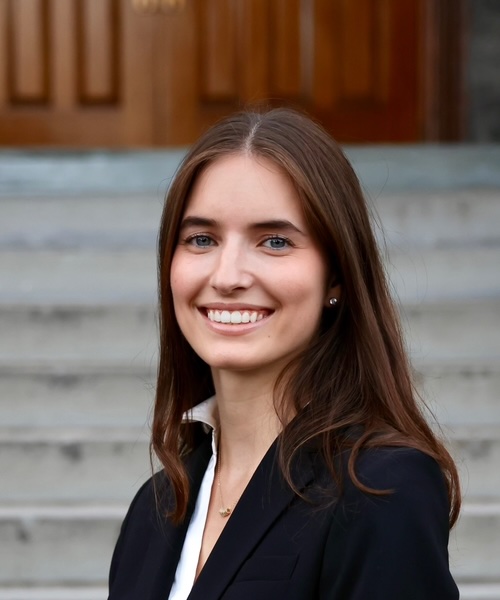One moment that especially stood out to me was when a speaker recalled how an encounter with a well-spoken, intelligent, and witty female writer changed her life. She used this anecdote to stress the importance of offering students strong role models — ones more meaningful than those presented on social media.
Concluding the IAJU Global Citizenship Fellows Program, I take many of these types of role models with me. First, I was deeply inspired by the Jesuit university leaders. It was incredible to be in the presence of people who were so keenly aware of the issues humanity is facing and passionate about creating a more just and equitable world. As Jesuits, their presentations reflected academic rigor, research, collaboration, and the “pursuit of truth.” They constantly tied in their moral responsibility as Christians and Jesuits to face these challenges and to be a force for good. Beyond nice words, they were practical and action-oriented, with regional presentations at the end highlighting their respective takeaways from the conference and steps they will take at home. I seek to bring these values and orientation to action into my own life.
Secondly, I found profound inspiration among my fellows. In a world marked by conflict, polarization, individualism, and greed, in these 11 young people, I experienced kindness, hope, empathy, and respect. They didn’t need the Assembly to be aware of the deep issues facing their respective countries and the world. However, as evidenced by their work in and outside of the classroom on migration, ethical AI, or sustainable agriculture, this is a group that is still hopeful, and more importantly, motivated to make change. I thank each of my fellows for fueling my hope and drive.
Dialogue as a Path to Global Citizenship
Throughout the fellowship, we defined global citizenship as both an appreciation of diversity and recognition of our common humanity. Dialogue was our means for how we would understand and practice global citizenship. At times, our group engaged in structured dialogue workshops, like the "Speaking Across Conflict" Workshop developed by Resetting the Table. In groups of three, one person responded to a difficult question, and the other two had to “hit the bullseye”— summarizing their core message in just a sentence or two. The goal was to reflect back the speaker’s perspective in a way that made them feel truly understood. I was able to “hit the bullseye” a few times, and it was also done for me. Hearing someone repeat (almost with more clarity) my position was impactful. It made me feel genuinely seen and heard. Hitting my partners’ bullseyes, I noticed their appreciation and satisfaction, and willingness to open up further. I felt the power of dialogue in this exercise: its ability to help us see, connect, and return to our shared humanness. We shared ways we would bring this back into our own lives, whether in navigating polarized political discourse, difficult personal conversations, or reconciliation work with refugees.
Some of the most meaningful conversations, however, were informal and shared over meals. Between bites of Colombian food or sips of coffee, I learned about politics and colonialism in Madagascar, religious tensions in India, educational access in Guatemala, the impact of the Hiroshima bomb, migration in Mexico, and the Yugoslav war. Despite my international background and education, many of these perspectives and issues were new to me. These moments forced me to open my mind and heart, and simply listen.
I also realized how connected we already were, especially through social media, global news, and even viral TikTok trends. We were also bound by shared experiences: as fellows, passionate students, young people, and human beings. In this appreciation of diversity and perspectives, as well as recognition of our shared humanity and the responsibility this brings, I leave the fellowship feeling successful in our understanding and practice of global citizenship.
Inspiring My Approach to Sustainability
One global issue that I am passionate about is sustainability. From rising sea levels to mounting textile waste, it is not hard to be concerned with climate change, environmental degradation, and overconsumption.
The Assembly’s panel on the environmental crisis started with the fact that global temperatures have already surpassed the Paris Agreement’s 1.5°C threshold in 2024. Among other eye-opening statistics and personal accounts, these conversations reignited my focus on the environment, reminding me of the scale of the crisis and deepening my sense of concern and urgency.
The Global Citizenship Curriculum Project also led me to see sustainability in a new light. One of our 4 educational modules focused on a values-based approach to the climate crisis. It spoke of sustainability as a spiritual, social, global, and personal imperative—caring for Earth as our common home, protecting the vulnerable, recognizing disproportionate impacts on the Global South, and taking individual responsibility. Thinking of it in this way, as I did for other issues throughout the IAJU Assembly, was impactful. It reminded me of my citizenship in a global community and the responsibility that comes with it. It carries weight heavier than wanting to “do good.”
The module also highlighted the global impact we can have as young people—through our lifestyle choices, careers, and international engagement. As I continue my academic journey and begin my professional one, I leave the Global Citizenship Fellows Program deeply touched by the experience. I am inspired to find ways I can have a positive impact on the environment and live out the values instilled in me through this program and through Jesuit education.

